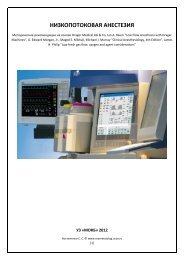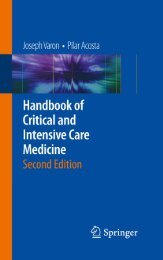- Page 2 and 3:
This page intentionally left blank
- Page 5 and 6:
Emergency Department Analgesia An E
- Page 7 and 8:
Contents List of contributors page
- Page 9 and 10:
Tension-type headache 384 Trigemina
- Page 11 and 12:
Michel Galinski, MD Attending Physi
- Page 13:
Benjamin A. White, MD Resident, Har
- Page 16 and 17:
xiv Foreword code to light up the p
- Page 18 and 19:
xvi Foreword The authors of the boo
- Page 21 and 22:
Preface A typical shift in the Emer
- Page 23 and 24:
Acknowledgments Many thanks to this
- Page 25:
General considerations
- Page 28 and 29:
4 Introduction and general approach
- Page 30 and 31:
6 Introduction and general approach
- Page 32 and 33:
8 Introduction and general approach
- Page 34 and 35:
10 Assessment of pain CATHERINE A.
- Page 36 and 37:
12 Assessment of pain n Pain assess
- Page 38 and 39:
14 Assessment of pain The Face, Leg
- Page 40 and 41:
16 Assessment of pain 3. Silka P, R
- Page 42 and 43:
18 Assessment of pain 33. Melzack R
- Page 44 and 45:
20 Prehospital analgesia and protoc
- Page 46 and 47:
22 Prehospital analgesia prehospita
- Page 48 and 49:
24 Prehospital analgesia care provi
- Page 50 and 51:
26 Prehospital analgesia EMS settin
- Page 52 and 53:
28 Prehospital analgesia 18. Kurtz
- Page 54 and 55:
30 Prehospital analgesia 48. Helm M
- Page 56 and 57:
32 Epidemiologic overview of ED pai
- Page 58 and 59:
34 Epidemiologic overview of ED pai
- Page 60 and 61:
36 Epidemiologic overview of ED pai
- Page 62 and 63:
38 Epidemiologic overview of ED pai
- Page 64 and 65:
40 Epidemiologic overview of ED pai
- Page 66 and 67:
42 Geriatric analgesia ULA HWANG AN
- Page 68 and 69:
44 Geriatric analgesia physiologic
- Page 70 and 71:
46 Geriatric analgesia Analgesic ap
- Page 72 and 73:
48 Geriatric analgesia The common e
- Page 74 and 75:
50 Geriatric analgesia 12. Hohl C,
- Page 76 and 77:
52 Chronic pain DAVID CLINE AND STE
- Page 78 and 79:
54 Chronic pain care providers, it
- Page 80 and 81:
56 Chronic pain the agent’s monoa
- Page 82 and 83:
58 Chronic pain be in the ED record
- Page 84 and 85:
60 Chronic pain 7. Freynhagen R, Bu
- Page 86 and 87:
62 NSAIDs and opioids applicable sa
- Page 88 and 89:
64 NSAIDs and opioids We believe th
- Page 90 and 91:
66 NSAIDs and opioids well-demonstr
- Page 92 and 93:
68 NSAIDs and opioids 5. Navascues
- Page 94 and 95:
70 Nonstandard medication delivery
- Page 96 and 97:
72 Nonstandard medication delivery
- Page 98 and 99:
74 Nonstandard medication delivery
- Page 100 and 101:
76 Nonstandard medication delivery
- Page 102 and 103:
78 Reflections on ED analgesia of u
- Page 104 and 105:
80 Reflections on ED analgesia para
- Page 106 and 107:
82 Reflections on ED analgesia chem
- Page 109:
Chief complaints and diagnoses
- Page 112 and 113:
88 Abdominal aortic aneurysm occurs
- Page 114 and 115:
90 Abdominal aortic aneurysm 19. Le
- Page 116 and 117:
92 Aortic dissection Citing sedativ
- Page 118 and 119:
94 Arthritis TODD M. LISTWA AND STE
- Page 120 and 121:
96 Arthritis NSAIDs may be safer th
- Page 122 and 123:
98 Arthritis for patients with high
- Page 124 and 125:
100 Arthritis rofecoxib, ordiclofen
- Page 126 and 127:
102 Arthritis For breakthrough pain
- Page 128 and 129:
104 Arthritis Pediatric: NSAID (e.g
- Page 130 and 131:
106 Arthritis 13. Hur C, Chan AT, T
- Page 132 and 133:
108 Arthritis 38. Curtis SP, Ko AT,
- Page 134 and 135:
110 Arthritis 63. Bliddal H, Tersle
- Page 136 and 137:
112 Biliary tract pain A retrospect
- Page 138 and 139:
114 Biliary tract pain n Summary an
- Page 140 and 141:
116 Biliary tract pain 20. Malesci
- Page 142 and 143:
118 Bites and stings - marine enven
- Page 144 and 145:
120 Bites and stings - marine jelly
- Page 146 and 147:
122 Bites and stings - marine 11. C
- Page 148 and 149:
124 Bites and stings - terrestrial
- Page 150 and 151:
126 Bites and stings - terrestrial
- Page 152 and 153:
128 Bites and stings - terrestrial
- Page 154 and 155:
130 Bites and stings - terrestrial
- Page 156 and 157:
132 Bites and stings - terrestrial
- Page 158 and 159:
134 Breast pain COX-2 selective NSA
- Page 160 and 161:
136 Breast pain Pregnancy: acetamin
- Page 162 and 163:
138 Burns JEREMY ACKERMAN AND ADAM
- Page 164 and 165:
140 Burns for moderate-to-severe bu
- Page 166 and 167:
142 Burns References 1. Singer AJM,
- Page 168 and 169:
144 Burns 30. Patterson DR, Ptacek
- Page 170 and 171:
146 Bursitis and periarticular infl
- Page 172 and 173:
148 Bursitis and periarticular infl
- Page 174 and 175:
150 Bursitis and periarticular infl
- Page 176 and 177:
152 Cancer and tumor pain bony (or
- Page 178 and 179:
154 Cancer and tumor pain (20 mg ev
- Page 180 and 181:
156 Cancer and tumor pain existing
- Page 182 and 183:
158 Cancer and tumor pain n Summary
- Page 184 and 185:
160 Cancer and tumor pain 21. Carac
- Page 186 and 187:
162 Cardiac chest pain KALANI OLMST
- Page 188 and 189:
164 Cardiac chest pain has traditio
- Page 190 and 191:
166 Cardiac chest pain Practice Gui
- Page 192 and 193:
168 Chest wall trauma MICHEL GALINS
- Page 194 and 195:
170 Chest wall trauma NSAIDs. As is
- Page 196 and 197:
172 Chest wall trauma n Summary and
- Page 198 and 199:
174 Chest wall trauma 21. Seltzer J
- Page 200 and 201: 176 Chronic low-back pain limited t
- Page 202 and 203: 178 Chronic low-back pain n Summary
- Page 204 and 205: 180 Cluster headache SOHAN PAREKH A
- Page 206 and 207: 182 Cluster headache n Summary and
- Page 208 and 209: 184 Corneal abrasion LISA CALDER n
- Page 210 and 211: 186 Corneal abrasion 6. Patrone G,
- Page 212 and 213: 188 Cystitis, urethritis, and prost
- Page 214 and 215: 190 Cystitis, urethritis, and prost
- Page 216 and 217: 192 Cystitis, urethritis, and prost
- Page 218 and 219: 194 Dysmenorrhea to that achieved w
- Page 220 and 221: 196 Dysmenorrhea 12. Fine PG. The r
- Page 222 and 223: 198 Endometriosis by 50-74% compare
- Page 224 and 225: 200 Esophageal spasm KALANI OLMSTED
- Page 226 and 227: 202 Esophageal spasm via central mo
- Page 228 and 229: 204 Fibromyalgia MICHAEL WALTA AND
- Page 230 and 231: 206 Fibromyalgia A multicenter plac
- Page 232 and 233: 208 Fibromyalgia n Summary and reco
- Page 234 and 235: 210 Fibromyalgia 15. Sayar K, Aksu
- Page 236 and 237: 212 Fibromyalgia 41. Russell IJ, Mi
- Page 238 and 239: 214 Gastritis and peptic ulcer dise
- Page 240 and 241: 216 Gastritis and peptic ulcer dise
- Page 242 and 243: 218 Gastritis and peptic ulcer dise
- Page 244 and 245: 220 Gastritis and peptic ulcer dise
- Page 246 and 247: 222 Gastritis and peptic ulcer dise
- Page 248 and 249: 224 Gastritis and peptic ulcer dise
- Page 252 and 253: 228 Gastroesophageal reflux disease
- Page 254 and 255: 230 Gastroesophageal reflux disease
- Page 256 and 257: 232 Hemorrhoids and perianal pain B
- Page 258 and 259: 234 Hemorrhoids and perianal pain a
- Page 260 and 261: 236 Hemorrhoids and perianal pain t
- Page 262 and 263: 238 Hemorrhoids and perianal pain C
- Page 264 and 265: 240 Hemorrhoids and perianal pain 9
- Page 266 and 267: 242 Hemorrhoids and perianal pain 3
- Page 268 and 269: 244 Migraine and undifferentiated h
- Page 270 and 271: 246 Migraine and undifferentiated h
- Page 272 and 273: 248 Migraine and undifferentiated h
- Page 274 and 275: 250 Migraine and undifferentiated h
- Page 276 and 277: 252 Migraine and undifferentiated h
- Page 278 and 279: 254 Mucositis and stomatitis KELLY
- Page 280 and 281: 256 Mucositis and stomatitis eviden
- Page 282 and 283: 258 Mucositis and stomatitis above)
- Page 284 and 285: 260 Mucositis and stomatitis 5. Dem
- Page 286 and 287: 262 Mucositis and stomatitis 30. Mu
- Page 288 and 289: 264 Neck and back pain - mechanical
- Page 290 and 291: 266 Neck and back pain - mechanical
- Page 292 and 293: 268 Neck and back pain - radicular
- Page 294 and 295: 270 Neck and back pain - radicular
- Page 296 and 297: 272 Neck and back pain - radicular
- Page 298 and 299: 274 Neck and back pain - spinal spo
- Page 300 and 301:
276 Neck and back pain - spinal spo
- Page 302 and 303:
278 Neuropathy - complex regional p
- Page 304 and 305:
280 Neuropathy - diabetic DAVID CLI
- Page 306 and 307:
282 Neuropathy - diabetic n Summary
- Page 308 and 309:
284 Neuropathy - diabetic 16. Lesse
- Page 310 and 311:
286 Neuropathy - HIV related 3600 m
- Page 312 and 313:
288 Neuropathy - HIV related 12. Le
- Page 314 and 315:
290 Neuropathy - overview OVER-THE-
- Page 316 and 317:
292 Neuropathy - overview The TCAs,
- Page 318 and 319:
294 Neuropathy - overview Gabapenti
- Page 320 and 321:
296 Neuropathy - overview However,
- Page 322 and 323:
298 Neuropathy - overview Reference
- Page 324 and 325:
300 Neuropathy - overview 27. Wiffe
- Page 326 and 327:
302 Neuropathy - phantom limb pain
- Page 328 and 329:
304 Neuropathy - phantom limb pain
- Page 330 and 331:
306 Ocular inflammation STEPHEN H.
- Page 332 and 333:
308 Ocular inflammation Other RCT d
- Page 334 and 335:
310 Ocular inflammation Pregnancy:
- Page 336 and 337:
312 Ocular inflammation 20. Frucht-
- Page 338 and 339:
314 Odontalgia MICHAEL T. SCHULTZ A
- Page 340 and 341:
316 Odontalgia 100 mg caffeine and
- Page 342 and 343:
318 Odontalgia TOPICAL THERAPY Topi
- Page 344 and 345:
320 Odontalgia 4. Cooper SA, Engel
- Page 346 and 347:
322 Odontalgia 32. Sveen OB, Yaekel
- Page 348 and 349:
324 Orthopedic extremity trauma inf
- Page 350 and 351:
326 Orthopedic extremity trauma The
- Page 352 and 353:
328 Orthopedic extremity trauma fem
- Page 354 and 355:
330 Orthopedic extremity trauma 35.
- Page 356 and 357:
332 Osteoporotic vertebral compress
- Page 358 and 359:
334 Osteoporotic vertebral compress
- Page 360 and 361:
336 Otitis media and externa benefi
- Page 362 and 363:
338 Otitis media and externa 5. Var
- Page 364 and 365:
340 Pancreatitis (which lacks effec
- Page 366 and 367:
342 Pancreatitis 5. Hubbard GP, Wol
- Page 368 and 369:
344 Pharyngitis KELLY YOUNG n Agent
- Page 370 and 371:
346 Pharyngitis complete pain relie
- Page 372 and 373:
348 Pharyngitis 7. Blagden M, Chris
- Page 374 and 375:
350 Pharyngitis 31. Shi Y, Gu R, Li
- Page 376 and 377:
352 Postdural puncture headache Cas
- Page 378 and 379:
354 Post-herpetic neuralgia JEREMY
- Page 380 and 381:
356 Post-herpetic neuralgia virtual
- Page 382 and 383:
358 Post-herpetic neuralgia 11. Raj
- Page 384 and 385:
360 Renal colic scores. 3 The Cochr
- Page 386 and 387:
362 Renal colic References 1. O’C
- Page 388 and 389:
364 Sialolithiasis n Summary and re
- Page 390 and 391:
366 Sickle cell crisis concluded th
- Page 392 and 393:
368 Sickle cell crisis One potentia
- Page 394 and 395:
370 Sickle cell crisis titrated in
- Page 396 and 397:
372 Sickle cell crisis but acute ca
- Page 398 and 399:
374 Sickle cell crisis treatment ti
- Page 400 and 401:
376 Sickle cell crisis 3. Dunlop RJ
- Page 402 and 403:
378 Sickle cell crisis Disease-rela
- Page 404 and 405:
380 Temporomandibular disorders NAT
- Page 406 and 407:
382 Temporomandibular disorders n S
- Page 408 and 409:
384 Tension-type headache SOHAN PAR
- Page 410 and 411:
386 Tension-type headache for TH, b
- Page 412 and 413:
388 Tension-type headache 18. Lance
- Page 414 and 415:
390 Trigeminal neuralgia as the ini
- Page 416 and 417:
392 Undifferentiated abdominal pain
- Page 418 and 419:
394 Undifferentiated abdominal pain
- Page 420 and 421:
396 Undifferentiated abdominal pain
- Page 422 and 423:
Tables
- Page 424 and 425:
Selected nonsteroidal anti-inflamma
- Page 426 and 427:
Selected opioids Maintenance pediat
- Page 428 and 429:
Other analgesic drugs Lactation Dos
- Page 430 and 431:
Other analgesic drugs (cont.) Lacta
- Page 432:
Other analgesic drugs (cont.) Lacta










